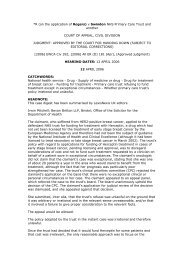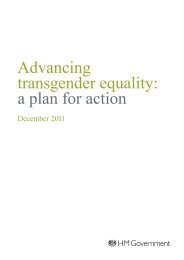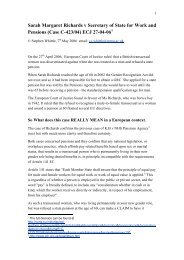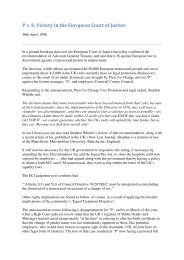Transgender EuroStudy â Legal Survey and Focus ... - ILGA Europe
Transgender EuroStudy â Legal Survey and Focus ... - ILGA Europe
Transgender EuroStudy â Legal Survey and Focus ... - ILGA Europe
You also want an ePaper? Increase the reach of your titles
YUMPU automatically turns print PDFs into web optimized ePapers that Google loves.
67 April 2008<br />
Proposals for Change<br />
From the online survey data results it is possible to highlight several major concerns:<br />
The current shortage of accessible, localised, access to specialist care for transgender <strong>and</strong><br />
transsexual people.<br />
That current service provision, even if accessible, generally provides a very poor experience<br />
for the trans person.<br />
Many current service providers need to take action so as to provide a regularized service<br />
that meets internationally recognised best practice (WPATH, 2001).<br />
The issue of the rights of trans people to dignity in healthcare.<br />
It is currently impossible to police the sort of single but complex multi-layered health care issue<br />
which trans health is, within the many different <strong>Europe</strong>an healthcare systems. At present, the few<br />
specialists in this area are unevenly distributed <strong>and</strong> are usually concentrated in urban Western <strong>Europe</strong>.<br />
Choice is often only available to those trans people with sufficient wealth to travel across borders <strong>and</strong><br />
to seek out more than one consultation.<br />
Access to specialist services should be made available to trans people in all areas, regardless of<br />
their local or national healthcare arrangements, or the individual’s financial status. Cross-boundary<br />
coordination would be helpful as some countries do not have access to the most advanced treatment<br />
<strong>and</strong> would need to contract such services. Access could be made possible for those patients who are<br />
unable to receive services in their local area through an EU travel fund, as continuous subst<strong>and</strong>ard<br />
healthcare can have harmful social, psychological <strong>and</strong> economic effects for the individual.<br />
Furthermore, as transgender <strong>and</strong> transsexual <strong>Europe</strong>ans move from one area to another due to<br />
the freedom of movement afforded by EU citizenship, issues of continuity of care arise. Greater<br />
practitioner education is required so that trans people in all areas of <strong>Europe</strong> have access to quality<br />
treatment on a more equal basis <strong>and</strong> so that prejudice is reduced at all levels. Facilitating the exchange<br />
of knowledge for both practitioner <strong>and</strong> patient would be an ideal way for the <strong>Europe</strong>an Union to<br />
promote higher levels of excellence <strong>and</strong> coordination.<br />
An evaluation should be undertaken by each <strong>Europe</strong>an country that will acknowledge <strong>and</strong><br />
address the needs of trans people in healthcare. This should take place in partnership with relevant<br />
stakeholders: local transgender <strong>and</strong> transsexual communities, healthcare providers <strong>and</strong> healthcare<br />
funding decision makers. These evaluations should be used to develop action plans that will propose<br />
solutions to healthcare disparities <strong>and</strong> that will support further equalities work. Trans people require<br />
policies that acknowledge human differences whilst recognising the right to appropriate treatment<br />
without unnecessary delay. It is imperative that there is a top-down shift in the view that trans-related<br />
healthcare is cosmetic or elective, <strong>and</strong> the needs of this patient group must be prioritised in line with<br />
other important medical treatments.<br />
There is also a clear need to move away from the view, as contained in Diagnostic <strong>and</strong> Statistical<br />
Manual (DSM) IV <strong>and</strong> International Classification of Diseases 10, that transgender <strong>and</strong> transsexual<br />
identities are the result of pathological mental illness. In order to reduce the stigma that currently<br />
exists another space within diagnostic structures needs to be found, for example within endocrinology<br />
or in surgery. This might seem impossible, when the main Diagnostic Consultative Committees of the<br />
American Psychiatric Association (APA, 1994) <strong>and</strong> the World Health Organisation (WHO, 1994) are still<br />
firmly embedded in the idea that to be trans is to suffer from mental disorder, even though they both








